Ultras
Ultras are a type of association football fans who are renowned for their fanatical support. The term originated in Italy, but is used worldwide to describe predominantly organised fans of association football teams. The behavioural tendency of ultras groups includes singing football chants, playing musical instruments such as drums, their use of flares and smoke bombs (primarily in tifo choreography), vocal support in large groups and the displaying of flags and banners at football stadiums, all of which are designed to create an atmosphere which encourages their own team and intimidates the opposing players and their supporters. The frequent use of elaborate displays in stadiums is also common.
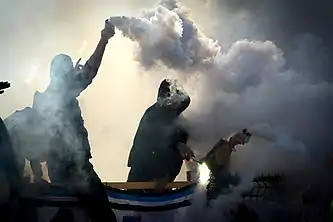
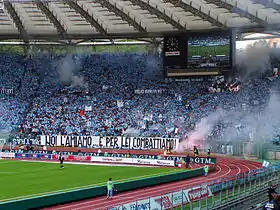
Ultras groups have been responsible for many cases of football hooliganism and violence,[1] although differently from hooligan firms, ultras do not have the explicit objective of fighting other fans.[2] Ultras groups are also in some cases directly linked to ideologies like neo-Nazism or other forms of either far-right,[3][4][5] or far-left politics.[6][7] In some instances, hooliganism and/or this politicization goes to the point where support for their team is relegated to a secondary feature of the phenomenon.[8]
In recent decades, the culture has become a focal point for the movement against the commercialisation of sports and football in particular.[9] Ultras also have regional variants and analogues, such as hooligans in United Kingdom, barra bravas in Hispanic America[10] and torcidas organizadas in Brazil.[11]
History

The origin of the ultras movement is disputed,[12] with many supporters groups from various countries making claims solely on the basis of their dates of foundation. The level of dispute and confusion is aided by a contemporary tendency (mainly in Europe) to categorise all groups of overtly fanatical supporters as ultras. Supporters groups of a nature comparable to the ultras have been present in Brazil since 1939, when the first torcida organizada was formed (although these groups began to focus on violence in the 1970s). Inspired by the torcidas and the colourful scenes of the 1950 World Cup, supporters of Hajduk Split formed Torcida Split on 28 October 1950.[13] The group is often cited as the oldest torcida style group in Europe. But the first supporters' groups in the world formed to produce violence were barras bravas, originated in Argentina in the 1950s.
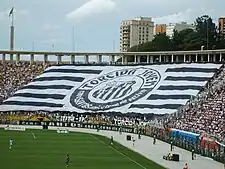
One country closely associated with the ultras movement is Italy.[12][14] The first Italian ultras groups were formed in 1951, including the Fedelissimi Granata of Torino. The 1960s saw the continuing spread and development of the culture with the formation of the Fossa dei Leoni and Boys San groups, the former often regarded in Italy as the first full-fledged ultras group (associated with violence). The term "ultras" was used as a name for the first time in 1969, when supporters of Sampdoria formed the Ultras Tito Cucchiaroni and fans of Torino formed the Ultras Granata. The style of support that would become synonymous with Italian football developed most during the 1970s, as more groups formed, including the radical S.S. Lazio Ultras in 1974, with a strong predominance of fascist slogans and chants amongst other groups such as Hellas Verona supporters. The active support of the ultras became more apparent, in contrast with the "traditional" culture, choreographic displays, signature banners and symbols, giant flags, drums and fireworks became the norm as groups aimed to take their support to higher levels.[15] The decade also saw the violence and unrest of Italian society at the time overlap with the ultras movement, adding a dimension that has plagued it ever since.[16] The ultras movement spread across Europe, Australia, Asia and North Africa during the 1980s, 1990s and 2000s, starting with the countries geographically closest to Italy.[17]
Characteristics
Ultras groups are usually centred on a core group of founders or leaders (who tend to hold executive control),[18] with smaller subgroups organised by location, friendship or political stance. Ultras tend to use various styles and sizes of banners and flags bearing the name and symbols of their group.[18][19] Some ultras groups sell their own merchandise to raise funds for performing displays.[18][20] An ultras group can number from a handful of fans to hundreds or thousands, with larger groups often claiming entire sections of a stadium for themselves. Ultras groups often have a representative who liaises with the club owners on a regular basis, mostly regarding tickets, seat allocations and storage facilities.[18] Some clubs provide groups with cheaper tickets, storage rooms for flags and banners and early access to the stadium before matches to prepare displays. These types of favoured relationships are often criticised when ultras groups abuse their power.[5]
Hooliganism
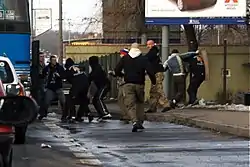
While ultras groups can become violent, the majority of matches attended by ultras conclude with no violent incidents. Unlike hooligan firms, whose main aim is to fight hooligans of other clubs, the main focus of ultras is generally to support their own team.[1] Some hooligans try to be inconspicuous when they travel; usually not wearing team colours, to avoid detection by the police. Within the ultra or hooligan culture however, those dressing to "blend in" would be referred to as casuals, which is viewed by some as a branch of hooliganism, yet still maintaining its own independence and culture. Ultras tend to be more conspicuous when they travel, proudly displaying their scarves and club colours while arriving en masse, which allows the police to keep a close eye on their movements.
Europe
Scotland
Green Brigade are an ultras group that follow Celtic F.C. and regularly make tifo displays and often voice support for a United Ireland. They are left-wing. On the other side of Glasgow are the Rangers F.C ultra group The Union Bears.[21] The Union Bears are known for their elaborate fan displays and their support for Northern Irish and Scottish unionism within the UK. Block Seven are a supporters group that support Hibernian FC, the Gorgie Ultras support rivals, Heart of Midlothian FC.
England
In England, there are ultras groups at Hartlepool United known as the NWC, Middlesbrough F.C (Red Faction), Crystal Palace F.C. (Holmesdale Fanatics), Ipswich Town F.C (Blue Action), Leicester City F.C (Union FS), Huddersfield Town F.C, and Stockport County (Hatters 83).[22][23][24] Several non-league football teams in England have ultras groups that are left-wing, such as the fans of Dulwich Hamlet F.C. who have a group called The Rabble.[25][26] A Vice article claims Casuals United are at war with anti-fascist football ultras.[27]
In late 2022, an Arsenal F.C. supporters group called "Ashburton Army" gained prominence, taking their name from Ashburton Grove, an historic road upon which the team's Emirates Stadium was built.[28][29][30]
Hungary
Several clubs in Hungary have large ultras groups, such as Ferencváros (Green Monsters), Újpest (Viola Fidelity), Diósgyőr (Ultras Diósgyőr), Honvéd (Ultras Kispest, Északi Kanyar), Fehérvár (Red Blue Devils), Tatabánya (Turul Ultrái), and Debrecen (Szívtiprók Ultras Debrecen). The national team of Hungary has an ultras group known as the Carpathian Brigade. The group was formed in 2009. Hungarian ultras occupy sector B Central at the Puskás Aréna.
Portugal
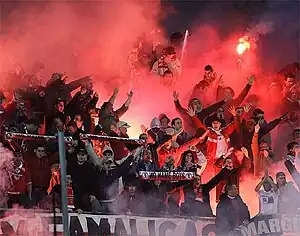
| Stadium | Club | Name |
|---|---|---|
| Estádio do Dragão | FC Porto | – Super Dragões – Colectivo Ultras 95 |
| Estádio do Bessa | Boavista FC | – Panteras Negras |
| Estádio da Luz | SL Benfica | No groups currently organized |
| Estádio José Alvalade | Sporting CP | – Juventude Leonina 1976 – Torcida Verde Directivo Ultras XXI – Brigada Ultras Sporting |
| Estádio D. Afonso Henriques | Vitória SC | – White Angels |
Greece
In Greece, most professional football teams have their ultras group. Most ultras groups are named after a specific gate number in their supporting team's stadium. Groups such as:
Groups such as:
- Gate 7 - Olympiacos F.C Fans (and PAS Giannina F.C Fans)
- Gate 4 - PAOK F.C Fans and OFI F.C Fans
- Gate 13 - Panathinaikos F.C Fans
- Gate 3 - PAS Lamia Fans
- Gate 6 - Panetolikos F.C Fans
- Gate 10 - Iraklis F.C Fans
- Gate 11 - Egaleo F.C Fans
- Gate 5 - Panseraikos F.C Fans
Sometimes, ultras may have an actual name instead of a Gate Number or these combined, such as:
- Original 21 (or sometimes Gate 21) - AEK Athens F.C Fans
- SUPER-3 - Aris F.C Fans
- Monsters (or Gate 1) - AEL F.C Fans
- Panthers - Panionios F.C Fans
Denmark
FC Copenhagen (Sektion 12) and Brøndby IF (Sydsiden) have some of the most renowned ultras groups on the continent, and the derby between the two is also one of the fiercest in Europe.[31]
AaB's ultras group caused a 14-minute delay in the 2020 Danish Cup final for a failure to adhere to COVID-19 social distancing rules.[32] The group was ultimately ejected from the stadium and the game resumed, which was won by Sønderjyske.
Italy

In Italy, most professional football clubs have an ultras group which attends every match and has dedicated seating areas in either the north or south end of the stadium behind the goals. Each ultras group will have one or more leaders who choreograph chants, and who hand out banners and flags to other people in the stand to wave throughout the match. Ultras have been credited with creating fantastic atmospheres inside the stadium; however they have also come under universal criticism because of ties to various gangs and the mafia, as well as causing violence which often takes place outside the stadium prior to a match. Over the years inappropriate chanting has resulted in the FIGC issuing partial or full stadium bans to clubs. The ultras will choreograph a wide range of chants throughout a match, but some of the most common chants that result in a ban are anti-Southern chants towards clubs which are located in the South of Italy, most notably towards Napoli, as well as racist chants towards opposition players. However, these issues only partially represent parts of the Ultras culture in Italy – Ultras in Italy are also known for fighting criminals and the Mafia, giving housing to immigrants or helping Italian citizens in need, as well as aiding with food and money during the Covid pandemic to their local hospitals.[33][34]
Ireland
Several groups exist in Ireland, as follows:
Shamrock Rovers - SRFC Ultras
St Patrick's Athletic - Shed End Invincibles
Drogheda United - Famous 45 Ultras
Dundalk FC - Shed Side Army
Bohemian FC - Notorious Boo Boys
Shelbourne FC - Briogaid Dearg
Poland
The first Polish ultras groups were formed in 1980s by fans of Legia Warszawa and Arka Gdynia. Those early ultra groups identified as either fascist or national-socialist and opposed communist government of Wojciech Jaruzelski. The 1990s saw the continuing spread and development of the ultra culture with the formation of the Wisła Sharks and Cracovia Jude Gang groups, the former often regarded in Poland as the first full-fledged ultras group. With intimidating and non-stop chanting, they've made their presence felt in the stands.[35] Modern hooligans try to be inconspicuous when they enter the stadium; usually not wearing team colours, to avoid detection by the police and PZPN officials.[36] Some modern Polish ultra groups denounce their neo-Nazi origins, with fans of Legia Warszawa often taking part in pride parades and attending various pro-LGBT happenings.[37][38]
Spain
Spanish ultraism is generally agreed to have come from Italian and English ultraism and hooliganism at the 1982 World Cup held in Spain. Held only seven years after the death of Franco, the World Cup was an opportunity for Spain to join the world of modern international football. Spanish ultraism is particularly known for its dramatic and polarized distinction across two ideological cleavages: fascism and nationalism. The vast majority of ultra groups identify as either fascist or anti-fascist, and either independentist or nationalist.[39]
Bosnia and Herzegovina
Bosniaks are known for their national ultras group BHFanaticos. Also, they have a few ultras that are connected to a football clubs Manijaci, Horde zla, Lešinari, Red Army, Škripari, Ultrasi and many more.
Cyprus
Gate-9 (Greek:Θύρα 9) is a Cypriot fans' group that supports the football team People's Athletic Club Omonia 1948 and all the sport departments of AC Omonia except football. Omonia supporters are traditionally left wing. A 2009 gallop poll estimated that three out of four Omonia fans vote for the Progressive Party of Working People, the communist party of Cyprus.[40] While the group retains its left wing beliefs, in recent years it has been openly critical of the party's involvement in the club's administrative decisions. The party has denied accusations that it influences club decisions.[41] Gate-9 members are associated with communist beliefs and have been noted for waving banners bearing Che Guevara's portrait, and other communist symbols.[42] The group is also involved in humanitarian work for refugees in Cyprus.[43] The group, besides Nicosia, has fan clubs in Limassol, Athens, Thessaloniki, Larnaka,[44] Paphos,[45] and London.[46]
There are also ultras groups affiliated with the APOEL FC[47] and the Anorthosis Famagusta FC.[48]
Malta
Although small in size, Malta has some notable ultras groups. The main ultras groups in Malta are Birkirkara Ultras 1997, Ultras Beltin 99, and Paola Boys Hibs Ultras, as well as the Maltese national football team ultras group, the South End Core.
Ukraine
| Stadium | Club | Name |
|---|---|---|
| Chernihiv Stadium | Desna Chernihiv | – Ultras Desna |
Romania
Romania's ultras only finds itself in the traditional teams like Steaua București, Dinamo București and Rapid București; but there are some small ultras groups which support their local club. The biggest ultras groups are: Peluza Nord Hunedoara, Peluza Şepcile Roşii, Peluza Nord Steaua, Peluza Sud Steaua, Peluza Cătălin Hîldan, and Peluza Nord Rapid. There are also some honourable mentions like Peluza Marină Farul, Peluza Sud Craiova, Peluza Şepcile Roşii and Peluza Nord Galați.
Türkiye
The three big clubs of Turkey, namely Beşiktaş, Fenerbahçe and Galatasaray, have a dedicated and passionate fanbase. The ultras of these clubs are Çarşı, Genç Fenerbahçeliler and UltrAslan, respectively.
Bulgaria
The most famous ultras in Bulgaria are Sector G (CSKA Sofia), Sector B (Levski Sofia), Bultras (Botev Plovdiv), and Lauta Army (Lokomotiv Plovdiv).
Africa
Algeria
| Stadium | Club | Name |
|---|---|---|
| Douera Sportpark Stadium | MC Alger | – Ultras the Twelfth Player 2011 – Ultras Green Corsaires 2012 – Ultra' Amore E Mentalita 2019 |
| Stade 20 Août 1955, Skikda | JSM Skikda | – Ultras Senza Confine 13 – Ultras Ouled Russicada 2015 |
| Mohamed Hamlaoui Stadium, Constantine | CS Constantine | – Ultras Loca Ragazzi 2010 – Ultras Green Army 2012 – Ultra' Iqbal 2023 |
| April 13, 1958 Stadium, Saida | MC Saida |
– Ultras Méga Boys 2007 |
| 20 August 1955 Stadium (Algiers), | CR Belouizdad |
– Ultras Fanatic Reds 09 |
| Stade 8 Mai 1945, Setif | ES Setif | – Ultras Inferno 10 |
| Stade du 5 Juillet, | USM Alger | – Les Unionistes Algérois – Alger Offender – Oni Orchestra 68 – El Assima – Ribellarsi |
| Ahmed Zabana Stadium, Oran | MC Oran | – Ultras Red Castle 2011 – Ultras Leones Rey 2009 – Forza Mouloudia |
| Maghrebi Unity Stadium | MO Bejaia | – Ultras Granchio 09 – Ultras Saldae Kings 2010 – Ultras Free Men 15 |
| May 19, 1956 Stadium | USM Annaba | – Les indepandants de bone 12 |
| 1 November 1954 Stadium (Tizi Ouzou) | JS Kabylie | – Ultras Kabylie Boys 09 – Ultras The Leader 2013 – Ultras Samba Boys 2013 |
| 20 August 1955 Stadium (Algiers), Algiers | NA Hussein Dey |
– Ultra Dey Boys 09 |
| Mohamed Boumezrag Stadium, Chlef | ASO Chlef |
– Ultras Polina 10 |
| 1 November 1954 Stadium (Batna), | CA Batna | – Ultras Aurès Boys 2009 – Ultras Furia Roja 2013 |
| Stade Imam Lyes, Médéa | O Medea | – Ultras Matador 26 |
| February 24, 1956 Stadium, Sidi Bel Abbès | USM Bel Abbès |
– Ultras Scorpion Trop Puissant |
| 1 November 1954 Stadium (Algiers) | USM El Harrach |
– Grinta Curva(UGG & UYC) |
| 20 August 1955 Stadium, Bordj Bou Arréridj | CA Bordj Bou Arréridj | – Ultras Commandos 2008 – Ultras Monstros 18 |
| El Alia Sports Complex | US Biskra |
– Ultras Pandilla Ziban |
| Touhami Zoubir Khelifi Stadium | AS Aïn M'lila |
– Red Scorpion |
| Stade Akid Lotfi | WA Tlemcen |
– Ultras Kop 13 |
| Stade 20 Août 1955 (Béchar) | JS Saoura |
– Ultras Giallo Verde |
| Stade Messaoud Zougar | MC El Eulma |
– Ultras Vikings 2009 |
| Maghrebi Unity Stadium | JSM Bejaia |
– Ultras Gouraya United |
| 1 November 1954 Stadium (Batna), | MSP Batna |
– Ultras Pantera Nera 2009 |
| Ismaïl Makhlouf Stadium | RC Arbaâ |
– Ultras Blue Vichingo |
| Stade Tahar Zoughari | RC Relizane |
– Ultras Verde Corazon |
| Stade Mokhtar Abdelatif | Amal Bou Saâda |
– Ultras Ouled el Khadra |
| Habib Bouakeul Stadium | ASM Oran |
– Ultras Verde Lupo |
| Stade Mohamed Reggaz | WA Boufarik |
– Ultras Orange W'arriors 2015 |
| Stade Ben Abdelmalek | MO Constantine |
– Ultras Libertados |
| Rouibah Hocine Stadium | JS Djijel |
– Ultras Green Gunners |
| Brakni Brothers Stadium | USM Blida |
– Ultras Green Killers 2014 |
| Stade Souidani Boujemaa | ES Guelma |
– Ultras Rebells Ragazzi |
| Omar Oucief Stadium | CR Témouchent |
– Ultras Red Wolves |
| Ahmed Kaïd Stadium | JSM Tiaret |
– Ultras Cavalier Blue |
| Stade Amar Benjamaa | ES Collo |
– Ultras Los Marinos 23 |
| Stade Mohamed Bensaïd | ES Mostaganem |
– Ultras Verde Marinero 12 |
| Stade de l'Unité Africaine | GC Mascara |
– Ultras Green Storm 2008 |
| Stade Zerdani Hassouna | US Chaouia |
– Ultras Giallo Boys |
| Mohamed Benhaddad Stadium | RC Kouba |
– Ultras Green Fans |
Morocco
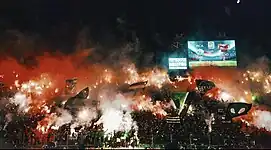
The history of Moroccan ultras can be traced back to the early 2000s, with the formation of the first ultras group, Ultras Tanger, in 2003. However, the first ultras group that still exists today is Ultras Green Boys, which was founded in 2005 to support Raja Casablanca. That same year, Ultras Winners was also founded to support Wydad Casablanca. The Moroccan ultras movement quickly gained momentum and popularity, with other notable groups such as Ultras Eagles (also supporting Raja Casablanca), being formed in 2006. Moroccan ultras groups are heavily influenced by European ultras movements, and are known for their passionate and dedicated support of their favorite football clubs. They are also known for their elaborate displays of choreographed support, including banners, flags, flares, and coordinated chants. Despite facing challenges, such as financial costs and loss of members, Moroccan ultras groups remain an important part of the country's football culture, known for their intense rivalries and unwavering support of their clubs.
Egypt
The clubs in Egypt became a major political force during the uprising against Mubarak in 2011, but were known for long-standing animosity with the police.[49] When 38 members of the Ultras Devils were arrested in "Shebeen al-Kom" for "belonging to an illegal group" plus additional violent offences, it was seen as a crackdown on the organisations by authorities.[49]
In 2013, the Associated Press stated that the Egyptian Ultras network was one of the most organised movements in Egypt after the Muslim Brotherhood.[49]
| Stadium | Club | Name |
|---|---|---|
| Cairo International Stadium | Al Ahly SC | – Ultras Ahlawy – Ultras Devils |
| Cairo International Stadium | Zamalek SC | – Ultras White Knights (UWK) |
| Port Said Stadium | Al-Masry SC | – Ultras Green Eagles |
| Suez Stadium | Suez Montakhab | – Ultras Suez Fedyan |
| Ghazl El Mahalla Stadium | Ghazl El Mahalla SC | – Ultras Whales 2008 |
| Ismailia Stadium | Ismaily SC | – Ultras Yellow Dragons – Ultras Rebels |
| Alexandria Stadium | Al Ittihad Alexandria Club | – Ultras Green Magic |
| El Mansoura Stadium | El Mansoura SC | – Ultras Orange Dragons |
| Aswan Stadium | Aswan SC | – Ultras Nile Crocodile |
| El Minya Stadium | El Minya SC | – Ultras Red Camels |
| Tanta Stadium | Tanta SC | – Ultras Sons of Sayed El Badawy |
| Damanhour Stadium | Ala'ab Damanhour SC | – Ultras Blues |
| Zagazig University Stadium | Sharkia SC | – Ultras Green Horses – Sons of Oraby |
| Shebin Stadium | Gomhoriat Shebin SC | – Ultras Balck Horses |
Tunisia
| Stadium | Club | Name |
|---|---|---|
| Stade Olympique de Radès | ES Tunis | Curva Sud Tunis – Ultras Lemkachkhines 2002 – Supras Sud 2004 – Blood & Gold 2005 – Zapatista Esperanza 2007 – Fedayn Espérantistes 2009 – matadors 2008 |
| Stade Olympique de Radès | Club Africain | Curva Nord Tunis – African Winners – Leaders Clubistes 2003 – North Vandals 2007 – Dodgers Clubistes 2007 |
| Stade Taïeb Mhiri | CS Sfaxien | Curva Nord Sfax – Black & White Fighters 2003 – Raged Boys 2007 – Ultras Sfaxiens 2007 – Leoni Bianconeri 2007 – Drughi Bianconeri 2013 |
| Stade Olympique de Sousse | ES Sahel | Curva Nord Sousse – Brigade Rouge 2001 – Ultras Fanatics 2003 – Ultras Saheliano 2007 |
| Stade 15 October | CA Bizertin | – Ultras Big Boss 2010 – Ultras Marines 2005 |
| Stade Abdelaziz Chtioui | AS Marsa | – Vikings Marsois 2011 |
Libya
| Stadium | Club | Name |
|---|---|---|
| The Tripoli International Stadium | Al-Ittihad Club (Tripoli) | – Ultras Teha Boys 2010 |
| The Tripoli International Stadium | Al Ahli SC (Tripoli) | – Ultras Flame Boys 2010 |
| Martyrs of February Stadium | Al-Ahly SC (Benghazi) | – Ultras Jazzara 2010 |
| Martyrs of February Stadium | Al-Nasr SC (Benghazi) | – Ultras Carboniera 2013 |
| Al Bayda Stadium | Al Akhdar SC | – Ultras Dour 2018 |
| Misurata Stadium | Asswehly SC | – Ultras Misrata Knights 2010 |
| Misurata Stadium | Alittihad Misurata SC | – Ultras Misurata Ghost 2017 |
| Zuwara Stadium | Aljazeera SC | – Ultras Yellow Army |
| Martyrs of February Stadium | Al Ta'awon SC | – Ultras Sa7ara 2018 |
| Derna Stadium | Darnes SC | – Ultras Tribuna Ragazzi |
Sudan
| Stadium | Club | Name |
|---|---|---|
| Al-Merrikh Stadium | Al-Merrikh SC | –Ultras Jawareh 2008 –Ultras Olympus Mons 13 |
| Al-Hilal Stadium | Al-Hilal SC | – Ultras Blue Lions 2008 |
Asia
Malaysia
In Malaysia, the ultras scene is characterized by the presence of "Ultras Malaya," the largest supporter club dedicated to the Malaysia national football team. "Ultras Malaya" made its debut in 2007 during the AFC Asian Cup campaign when Malaysia co-hosted the competition along with Thailand, Indonesia, and Vietnam.
"Ultras Malaya" boasts a diverse membership with fans from different ethnic backgrounds, states, and clubs across Malaysia. The group represents fans from all 14 states and other subdivisions within Malaysia. One of the most significant rivalries in Southeast Asian football is between "Ultras Malaya" and the fans of the Indonesia national football team. This rivalry is famously known as the "Nusantara derby" and has witnessed several intense clashes before, during, and after matches between the two nations, both on and off the field.
"Ultras Malaya" witnessed a gradual increase in its membership over the years, reaching its zenith during the AFF Suzuki Cup in 2014, when the number of members soared into the tens of thousands, although exact figures are not confirmed.
As time passed, UM07, the parent organization of "Ultras Malaya," expanded its reach by establishing subsidiary groups at the state and club levels across Malaysia. These subsidiary supporter groups are passionate in their support for both their local clubs and the national team. Here are some of the main ultras and supporters groups associated with specific states and clubs:
- Johor Darul Ta'zim FC: "Boys of Straits" (Super League, formed in 2010)
- Kedah Darul Aman FC: "Ultras Kedah 09" (Super League, founded on December 29, 2009)
- Kelantan FC: "Gate H Boys" (Premier League, established in 2010)
- Kuala Lumpur City FC: "Citiboys Ultras" (Super League, founded on February 28, 2011)
- Melaka United: "Taming Sari Ultras" (Super League, established on January 11, 2011)
- Negeri Sembilan FC: "Ultras Nogori 9" (Super League, formed on May 15, 2010)
- Penang FC: "Ultras Panthers" (Super League, emerged in 2011)
- Perak FC: "Silver State Ultras" (Premier League, established in April 2009)
- Perlis FA: "Brigate Gialloblu Perlis" (Malaysia M3 League, formed around 2010 or 2011)
- Sabah FC: "North Borneo Ultras" (Super League, founded on April 5, 2011)
- Sarawak United: "GB13" (Super League, established in 2011)
- Selangor FC: "UltraSel Curva" (Super League, formed in 2010)
- Pahang Sri Pahang FC: "Elephant Army" (Super League, founded on February 3, 2010)
- Terengganu FC: "Ultras Tranung" (Super League, established in 2010)
Within "Ultras Malaya," the role of the Capo is crucial in leading the chanting and energizing the crowd inside the stadium. One of the most well-known Capos of "Ultras Malaya" is Mohd Ridzuan Ahmad, also known as Lekir Haji Ahmad. His leadership and coordination skills have contributed to the vibrant and passionate atmosphere during Malaysia's football matches, making him a respected figure among the ultras community.
Lebanon
The ultras scene was introduced to Lebanon in February 2018, with Nejmeh's "Ultras Supernova" and White ultras for racing Beirut 2019.[50][51][52] Their rivals Ansar quickly followed with their own ultras group, "I Tifosi", one month later.[51] Ahed formed their own ultras group, called "Ultras Yellow Inferno", the same year.[52] Prior to the Arab Club Champions Cup game between Nejmeh and Al-Ahly of Egypt, played on 13 August 2018, seven "Ultras Supernova" fans were arrested by the Egyptian national security because of the negative connotations the word "Ultras" has in Egypt.[53] The fans have been returned to Lebanon by request of the Lebanese Ambassador to Cairo.[54]
Jordan
| Stadium | Club | Name |
|---|---|---|
| Amman International Stadium | Al-Faisaly SC | –Ultras Al Faisaly 2013 |
| King Abdullah II Stadium | Al-Wehdat SC | – Wehdaty Group 2012 –Ultras Green Knights 2018 |
United Arab Emirates
Ultras Junoon is an Emirati group that was founded in 2010 by the fans of Al-Wasl Club. This club is considered to have the largest fan base in the Emirates, and Al-Wasl Club fans are considered the first club that came up with the idea of Ultras in the Gulf region. It is mentioned that Al Wasl fans were the main reason for increasing excitement in the region and increasing the viewership of the league in the Emirates, in particular. The Ultras Junoon have a great ability to preserve the history of this club, and they are close to making any decision in the interest of this club.
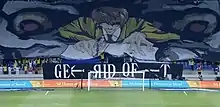
India
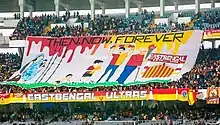
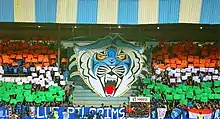
The ultras scene in India was introduced by East Bengal Ultras, the ultras group of East Bengal FC, in 2013, and since then it grew slowly, as ultras groups of various clubs started to form and display of "Tifo's" and "Pyro" shows became very much a part of the ultras scene in Indian football.[55]
Blue Pilgrims is an organised group of football fans who support the India national football men's team, women's team, and all the other age – group national teams at every home and away game, formed by a group of football fans of several club fan bases of football clubs from India. Founded in 2017 before the commencement of the 2017 FIFA U-17 World Cup, which was held in India, the group based their name on the nickname of the national team, the "Blue Tigers". They consider travelling with the national teams, to wherever the teams play, as their pilgrimage. They often display flags, banners, and tifos in support of the national team.[56]
| Stadium | Club | Name |
|---|---|---|
| Salt Lake Stadium, Kolkata | East Bengal FC | – East Bengal Ultras |
| Salt Lake Stadium, Kolkata | East Bengal FC | – East Bengal the Real Power |
| Salt Lake Stadium, Kolkata | Mohun Bagan AC | – Mariners Dé Xtreme |
| Salt Lake Stadium, Kolkata | Mohun Bagan AC | – Mariners' Base Camp[57] |
| Jawaharlal Nehru Stadium, Kochi | Kerala Blasters FC | – Manjappada |
| Sree Kanteerava Stadium, Bengalore | Bengaluru FC | – West Block Blues |
| Mumbai Football Arena, Mumbai | Mumbai City FC | – West Coast Brigade |
| G. M. C. Balayogi Athletic Stadium, Hyderabad | Hyderabad FC | – Deccan Legion |
Oceania
Australia
.jpg.webp)
| Stadium | Club | Name |
|---|---|---|
| Coopers Stadium, Adelaide | Adelaide United FC | – Red Army |
| Suncorp Stadium, Brisbane | Brisbane Roar FC | – The Den |
| Industree Group Stadium, Gosford | Central Coast Mariners FC | – Yellow Army |
| Campbelltown Sports Stadium, Sydney | Macarthur FC | – The Bullpen |
| AAMI Park, Melbourne | Melbourne Victory FC | – Original Style Melbourne |
| AAMI Park, Melbourne | Melbourne City FC | – Yarra End Collective |
| McDonald Jones Stadium, Newcastle | Newcastle Jets FC | – Squadron Novocastria |
| HBF Park, Perth | Perth Glory FC | – The Shed |
| Allianz Stadium, Sydney | Sydney FC | – The Cove |
| CommBank Stadium, Parramatta | Western Sydney Wanderers FC | – Red and Black Bloc |
| AAMI Park, Melbourne | Western United FC | – Western Service Crew |
New Zealand
| Stadium | Club | Name |
|---|---|---|
| Wellington Regional Stadium, Wellington | Wellington Phoenix | – Yellow Fever |
North America
Canada
| Stadium | Club | Name |
|---|---|---|
| Stade Saputo | CF Montréal | – Collectif Impact Montréal, Bolos Crew, Brigade, 132crew |
| BMO Field | Toronto FC | – Block 114 |
| Wanderers Grounds | HFX Wanderers FC | – Block 108 Ultras |
| Tim Hortons Field | Forge FC | - Barton St. Battalion |
United States
| Audi Field | D.C. United | – District Ultras[58] |
| PayPal Park | San Jose Earthquakes | – San Jose Ultras[59] |
| Red Bull Arena | New York Red Bulls | – Torcida 96[60] |
| Subaru Park | Philadelphia Union | – Sons of Ben |
| CenturyLink Field | Seattle Sounders FC | – Emerald City Supporters[61] |
| Dignity Health Sports Park | Los Angeles Galaxy | – Ghosts Ultras Galaxy |
| Providence Park | Portland Timbers | – Timbers Army |
| Banc of California Stadium | Los Angeles Football Club | – The 3252 |
| Children's Mercy Park | Sporting Kansas City | – Fountain City Ultras |
| Yankee Stadium | New York City Football Club | – Ultras NYC[62]
– Los Templados |
| Keyworth Stadium | Detroit City FC | – Northern Guard Supporters |
See also
References
- "Ultra vires". Spiked. 9 February 2007. Archived from the original on 24 February 2011. Retrieved 18 January 2011.
- "What is a football ultra? Serie A hardcore fan culture explained".
- Pantelick, Nicolas (2 February 2022). "Fanaticism and the "Ultras" Movement: How Far Will You Go to Support Your Team?". Harvard International Review.
- Parkin, Simon (24 April 2018). "The rise of Russia's neo-Nazi football hooligans". The Guardian.
- "The dark heart of Italian soccer". CBC Sports. 15 April 2005. Archived from the original on 24 February 2011. Retrieved 18 January 2011.
- "Learning from adjacent fields: the relation between extremism and hooliganism" (PDF). home-affairs.ec.europa.eu. 25–26 October 2018. Archived (PDF) from the original on 17 July 2023. Retrieved 4 August 2023.
- Jones, Tobias (26 March 2020). "1312 by James Montague review – inside the world of football's ultras". The Guardian. ISSN 0261-3077. Retrieved 4 July 2023.
- "Fan tragedy sends the fight against Ultras back to square one". The Guardian. 12 November 2007. Archived from the original on 4 December 2013. Retrieved 18 January 2011.
- "Are German fans really turning against the beautiful game?". The Guardian. 7 April 2008. Archived from the original on 4 December 2013. Retrieved 18 January 2011.
- "World Cup 2022: Argentina's 'barras bravas' bring the noise – DW – 12/11/2022". dw.com. Retrieved 8 March 2023.
- "Torcidas Organizadas: Torcidas Organizadas no Brasil e no Mundo". Brasil Escola (in Brazilian Portuguese). Retrieved 8 March 2023.
- "We Don't Fight, We Paint Flags Instead". In Bed With Maradona. 2 November 2010. Archived from the original on 13 July 2011. Retrieved 5 February 2011.
- "Povijest". Torcida.hr (in Croatian). Archived from the original on 17 February 2011. Retrieved 5 February 2011.
- "Ultra sensitive". When Saturday Comes. April 2007. Archived from the original on 24 January 2011. Retrieved 18 January 2011.
- "Ultras rule?". Football Italia. 28 October 2009. Archived from the original on 23 November 2010. Retrieved 18 January 2011.
- Alberto Testa, Gary Armstrong (2010). Football, Fascism and Fandom. A&C Black. ISBN 978-1-4081-2371-3.
- "Passion, politics and violence: A socio-historical analysis of Spanish ultras". March 2005.
{{cite journal}}: Cite journal requires|journal=(help) - "Ultras pull the strings as Italy descends into chaos". The Guardian. 4 February 2007. Archived from the original on 2 October 2014. Retrieved 5 February 2011.
- "Gruppi". asromaultras.org (in Italian). Archived from the original on 12 February 2011. Retrieved 5 February 2011.
- "AS Roma Ultras". asromaultras.org (in Italian). Archived from the original on 13 February 2011. Retrieved 18 January 2011.
- "Rangers ultras Union Bears' eerie message after Ibrox fans storm own POTY Awards in Glasgow".
- Bakowski, Gregg (23 October 2016). "Ultra culture could help Premier League terraces take positive steps". The Guardian. Archived from the original on 11 April 2018. Retrieved 10 April 2018.
- "Palace 'ultras' causing anxiety". ESPN. Archived from the original on 11 April 2018. Retrieved 10 April 2018.
- Barker, Matthew. "When Saturday Comes – Crystal Palace ultras under pressure from club and fans". When Saturday Comes. Archived from the original on 11 April 2018. Retrieved 10 April 2018.
- "Eastbourne Town's 'ultras' are game for a laugh and making football welcome to all". iNews. 16 November 2017. Archived from the original on 11 April 2018. Retrieved 10 April 2018.
- "London's Left-Wing Utopian Non-League Ultras Are Reclaiming Football". Vice. 5 January 2015. Archived from the original on 11 April 2018. Retrieved 10 April 2018.
- "The English Far-Right's War on Anti-Fascist Football Ultras". Vice. 13 February 2015. Archived from the original on 11 April 2018. Retrieved 10 April 2018.
- "Who are Ashburton Army? The Arsenal ultras group AFTV could only dream of". Thick Accent. 30 December 2022. Retrieved 18 March 2023.
- "The Clock End's boys in black: a look into Arsenal's 'ultras'". Pain in the Arsenal. 6 October 2022. Retrieved 28 December 2022.
- "Arsenal fan 'ultras' filmed ahead of West Ham game, fans are divided over the footage". SPORTbible. Retrieved 28 December 2022.
- "The Copenhagen sektion 12 is Denmarks biggest ultra group they maintain over 10000 people just on the sekttion 12Derby". Outside Write. 31 March 2016. Retrieved 9 September 2020.
- "Danish Cup Final Delayed". bbc.com. 1 July 2020.
- Jones, Tobias (15 September 2019). "At home with Italy's ultras: 'It isn't about watching football, but watching each other'". The Guardian. ISSN 0261-3077. Retrieved 29 July 2020.
- Monella, Lillo Montalto (9 November 2019). "Racism in football: Are Italy's Ultras the problem or the solution?". euronews. Retrieved 29 July 2020.
- Subcultrue of stadium hooligans – Pathology or crime?
- Jurczewski, Mariusz (October 2013). "Prawno-kryminalistyczna problematyka przestępczości stadionowej". Wydział Prawa, Uniwersytet w Białymstoku.
- "Homoseksualni kibice? CWKS Legia Sekcja LGBT na Facebooku". Polska Times. 9 January 2014. Retrieved 7 May 2023.
- "Geje i lesbijki na trybunach Legii Warszawa". Polskie Radio. 10 January 2014. Retrieved 7 May 2023.
- Westby, David (2017). "Ultras in Spain: A Study on the Relationship Between Macro-level Cleavages and Micro-level Actors". doi:10.13140/RG.2.2.28548.94088.
{{cite journal}}: Cite journal requires|journal=(help) - "Η ΚΑΘΗΜΕΡΙΝΗ, kathimerini.com.cy". www.kathimerini.com.cy. Retrieved 20 September 2021.
- "Η θύρα 9 μεγάλωσε και δεν ελέγχεται".
- "Omonoia: Feisty team blends sports and left politics". 3 October 2011.
- "Αθλητικά νέα - Αθλητικές ειδήσεις για όλα τα sport | Thema Sports". Archived from the original on 15 September 2015. Retrieved 15 July 2021.
- "Archived copy". Archived from the original on 14 July 2014. Retrieved 30 June 2014.
{{cite web}}: CS1 maint: archived copy as title (link) - http://sport-fm.com.cy/podosfairo/omonoia/item/1676-omonoia-«ομάδα-όλης-της-κύπρου»/1676-omonoia-«ομάδα-όλης-της-κύπρου».html
- "Ομόνοια: Χαμός στο Συ.Φι. Λεμεσού με Καϊάφα και παίκτες! (pics) | Α' Κατηγορία | Κύπρος | Ποδόσφαιρο | BALLA". Archived from the original on 22 March 2014.
- ΠΑΝ.ΣΥ.ΦΙ (in Greek). APOEL FC. Archived from the original on 20 May 2008. Retrieved 23 May 2008.
- sigmalive/ΚΥΠΕ (22 February 2014). "Επεισόδια στον πετοσφαιρικό αγώνα Αναγέννηση- Ανόρθωση". Retrieved 3 May 2016.
- el Deeb, Sarah (14 March 2013). "Egypt: 38 soccer fans charged with violence". USA Today. Associated Press. Archived from the original on 10 October 2017. Retrieved 10 October 2017.
- "المدرجات لا تعترف إلا بالشجعان". lebanonfg.com. Retrieved 23 February 2019.
- COPA90. "Ultras Supernova: Lebanon's First Ultras Group". www.facebook.com. Retrieved 23 February 2019.
- "مباريات قويّة في الجولة العاشرة". الأخبار (in Arabic). Retrieved 23 February 2019.
- "قضية مشجعي "النجمة" الموقوفين في مصر... ماذا جرى معهم؟". LBCI Lebanon (in Arabic). Retrieved 23 February 2019.
- "Lebanese Nejmeh fans to be deported days after arrest at Borg al-Arab Stadium | MadaMasr". madamasr.com. Archived from the original on 25 February 2019. Retrieved 25 February 2019.
- "A Fans Revolution : East Bengal Ultras – GoalBold". 3 July 2018. Archived from the original on 3 July 2018. Retrieved 5 January 2021.
- "Indian national football teams to have dedicated fan base named 'Blue Pilgrims". www.sportskeeda.com. 3 October 2017. Retrieved 2 October 2019.
- "Mariners' Base Camp – The Ultras of The National Club of India Mohun Bagan". Archived from the original on 5 December 2020. Retrieved 28 December 2019.
- "District Ultras – Home".
- "San Jose Ultras – Home". sanjoseultras.com.
- "Torcida 96 – Home". Facebook.
- "Emerald City Supporters – Home". Facebook.
- "Ultras NYC – Home". Instagram.
Further reading
- Guerra Nicola (2014). "Il discorso e la lingua speciale del calcio, una definizione inclusiva. I meccanismi di creazione dei neologismi e le dinamiche di contatto e interferenza" Annals of the University of Craiova Guerra, Nicola (January 2013). "Dalla strada alla letteratura, le spericolate e propizie vicende del forestierismo A.C.A.B.. Il contatto linguistico tra italiano e inglese nelle sottoculture Skinhead e Ultras". Analele Universităţii Din Craiova, Seria Ştiinţe Filologice Linguistică Nr. 1-2.
- Guerra Nicola (2011). "Meccanismi e significati linguistici di un'identità contemporanea: analisi dello spazio linguistico di una tifoseria ultras di calico". Annals of the University of Craiova.
- Guerra Nicola, Valentina Imperi, Claudia Vardanega (2010). "I Poeti della Curva: Un'analisi sociolinguistica degli striscioni allo stadio". Aracne.
{{cite web}}: CS1 maint: multiple names: authors list (link) - Prof. Dr. Gunter A. Pilz: "International Conference on Ultras. Overview of the Ultra culture phenomenon in the Council of Europe member states in 2009" (PDF). (195 KB) Leibniz University Hanover, 18 January 2010.
- Testa, A. and Armstrong, G. (2008). "Words and actions: Italian ultras and neo-fascism" Social Identities, vol. 14 (4), pp. 473 – 490
- Testa, A. (2009) "UltraS: an Emerging Social Movement", Review of European Studies, vol. 1 (2), 54–63
- Testa, A. (2010). Contested Meanings: the Italian Media and the UltraS. Review of European Studies, vol 2(1), 15–24
- Testa, A. and Armstrong, G. (in press; November 2010). Football, Fascism and Fandom: The UltraS of Italian Football, A&C (Bloomsbury), London, Black Publishers.
- "Violence Threats to Italian Iconic Landmarks and Stadiums". 5 March 2017.TAL Global Corporation.d